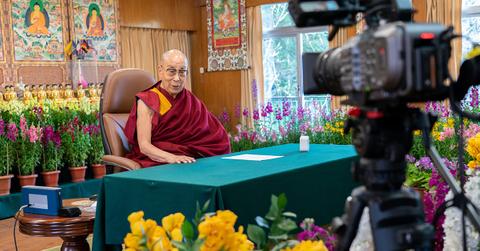How Is the Dalai Lama Chosen? The 14th Dalai Lama Incited Some Controversy Recently
Published April 10 2023, 2:15 p.m. ET
As the nationally revered spiritual leader of the Tibetan Buddhism school of the Gelug, the Dalai Lama is well-known throughout the world as an advocate who strives for a free Tibet and peace throughout the world. Yet even one of such religious importance can ruffle a few feathers.
On April 9, 2023, several outlets reported that the 14th Dalai Lama, aka Tenzin Gyatso, asked a young boy to "suck [his] tongue" at a public event. Footage of the incident went viral, with folks divided over whether or not the comment was appropriate.
The Dalai Lama's official Twitter subsequently issued an apology, stating that while he greets people with gestures intended to be "innocent and playful," he deeply regrets the comment.
The controversy now has people asking how the Dalai Lama is chosen.
How is the Dalai Lama chosen? The process can begin even before the previous one dies.
The Dalai Lama is the renowned spiritual leader of Tibet. They are often regarded as a unifying symbol of the Tibetan state and advocates for all Buddhist values and traditions. It is typically their responsibility to unify religious groups and regions.
Since 1411, there have 14 people who have been designated as the Dalai Lama. The most recent one, Tenzin Gyatso, was first appointed in February 1940. He is currently 87 years old.
Typically, the next Dalai Lama is appointed after the death of the previous one. Tenzin Gyatso began his reign three years after the death of the 13th Dalai Lama in 1933.
As for how the next Dalai Lama is chosen, however, it's an interesting process. Unlike other religious leaders like the Pope who are elected to their positions, it is not necessarily a matter of people campaigning to become the next Dalai Lama. In fact, it is believed that the next Dalai Lama is determined by reincarnation.
The successor for the Dalai Lama is chosen after much religious consultation.
One of the major beliefs of Buddhism is reincarnation, the process by which a person is reborn as something else upon dying in their current life. In this cycle of rebirth, referred to as "samsara," one's existence is an ongoing cycle of life, death, and rebirth.
By that same tenet, the Dalai Lama's existence is tied to reincarnation. It is believed the proceeding Dalai Lama is a reincarnation of the previous one.
That being said, there is an interesting selection process in determining who the Dalai Lama reincarnates into. According to the Sydney Morning Herald, the search for the Dalai Lama's next reincarnation can begin even before the current one has passed. Tibetan monks initiate a search that involves consulting oracles and reading signs. Reportedly, they can even derive clues about the next Dalai Lama from the body of the previous one upon their deaths.
The search typically collects children who are born around the time of the Dalai Lama's death, and further spiritual consultation is utilized to determine the correct reincarnation. Once they are discovered, they are almost immediately appointed as the Dalai Lama, even as children. Tenzin Gyatso appointed as the Dalai Lama in 1940, but he was only born in 1935, making him 5 years old when he was granted the title.
Ahead of the 14th Dalai Lama's passing, there has already been controversy surrounding the search for his successor. The Guardian reports that China, which exerts strict control over the country, has attempted to argue that they have the right to decide the next Dalai Lama. Their claim to his title has caused significant global backlash.
As of this writing, a new Dalai Lama has not yet been named.

